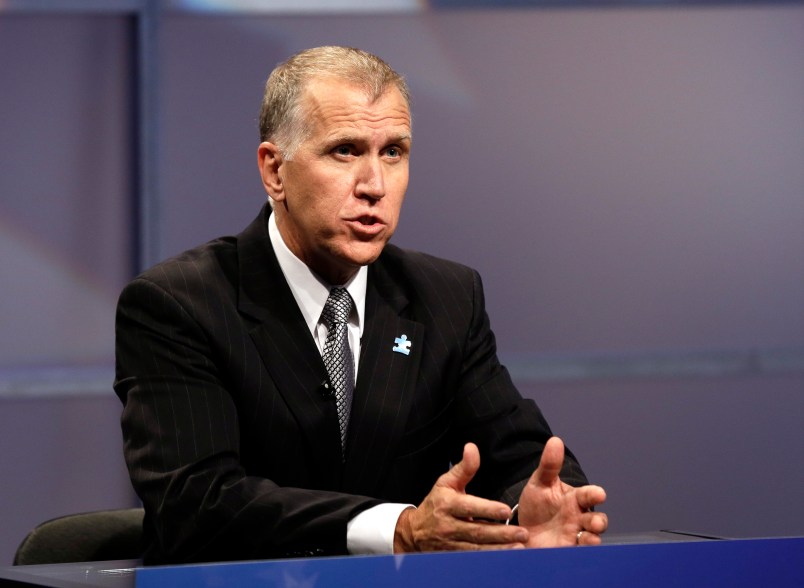To fend off a Democratic takeover of the Senate, Republicans had to do a major tone shift on Obamacare. Now that their softened approach has helped save their most vulnerable members, will they stick to it?
The last two years of Republican health care politics have been a stunning pivot from the decade that preceded them. The GOP’s relentless campaign to destroy the Affordable Care Act fell apart in 2017, when Republicans actually had the power to fully dismantle the law but failed to do so. As a 2018 blue wave focused on protecting Obamacare won Democrats the House, congressional Republicans made a course correction towards ACA detente, while signaling that they wanted to focus on other health care issues instead.
In the weeks before the election, Majority Leader Mitch McConnell (R-KY) even mocked the idea that the Supreme Court would invalidate the law in a case being heard this week — even though he previously said he backed the Trump administration’s support of the lawsuit.
Regardless of its honesty, it appears the messaging pivot worked.
The two most surprising GOP Senate holds last week came in the races Maine Sen. Susan Collins (R-ME) and North Carolina Sen. Thom Tillis (R-NC). The two of them — though in different ways — were on the frontline of the less antagonist posture toward Obamacare the GOP has recently tried to the take.
Collins voted against the repeal effort in 2017, and more recently, is the caucus’ most vocal critic of the anti-Obamacare lawsuit that’s before the Supreme Court.
Tillis’ come-to-Jesus moment on Obamacare came a little bit later than Collins’, but in recent months he’s played a leading role in the GOP’s efforts to soften its tone on the ACA.
He was the lead sponsor of the bill Republicans put forward that they claimed showed their commitment to covering pre-existing conditions. (Their claims about the legislation were misleading, since it included some loopholes that would allow insurers to charge those high-risk individual more and let them refuse to cover certain treatments for pre-existing conditions). Tillis’ name was often invoked when Senate Republicans were asked about their eagerness to see Obamacare ended and McConnell even forced a procedural vote on the bill.
There’s still a chance that a Republican Senate majority could be foiled by Democrats winning both of the races going to run-off in Georgia in January. But Georgia Democratic wins that would bring the Senate to 50-50 are a long shot.
In the meantime, an early test of where Republicans intend to go on Obamacare comes in the form of a case being heard by the Supreme Court Tuesday.
The lawsuit, if successful, would invalidate the Affordable Care Act in its entirety. A Republican-held Senate could rob Democrats of their back-up plan to protect the ACA from Supreme Court invalidation. The case rests on a dubious legal claim that when congressional Republicans in their 2017 tax legislation zeroed out the ACA’s individual mandate, they rendered the whole act unconstitutional. Passing another law restoring the mandate, even to just $1, would moot the case.
Whether Republicans agree to such an off-ramp will set the tone for their willingness to work with Democrats on health care going forward.
Perhaps, humbled by the failure under the Trump administration to come up with an Obamacare replacement, and out of a desire to prepare for a 2022 midterm where several more Senate Republicans up for re-election, Republicans will finally accept that the Affordable Care Act is here to stay.
But even with Joe Biden in the White House, a GOP Senate could continue to do a lot of damage to the ACA if it wanted to revive their pre-2017 anti-Obamacare approach. Republicans could find clever ways to undercut its operations, while refusing to go along with needed fixes without demanding other concessions that weaken the law.
Those were tactics they perfected the last time Biden was in the White House, serving as President Obama’s vice president. Under-the-radar GOP measures that hamstrung key provisions injected instability into the ACA marketplaces, which in turn allowed Republicans to blame Obamacare for underdelivering on its promises.
Biden has made clear he wants to work with Republicans to be a part of the solution. But exacerbating the problems might be the only way the GOP knows how to operate under a Democratic administration.







The arguments in the Republican Supreme Court tomorrow will be instructive. The case should be laughed out of court, it’s about as meritless as any case that has ended up there in recent years…it’s only there because Trump judges pushed it forward. I expect the Republican justices to sound as wishy washy as they can, so they don’t give away how they plan to rule…Alito might go at the lawyers defending the ACA, but that’s about it. I also don’t expect a quick decision. All of this will be arranged to disguise their desire to overturn the ACA, a decision we’ll get after the GA runoff so that turnout for people who want health care doesn’t skyrocket in the election.
My only question is how far they take the decision…do they limit themselves to this one minor case or use it as a vehicle to take on other parts of the government they want to destroy? Every case the RSC decides from here until the Republican majority is ended should be looked at with that question in mind, this is their big chance to undo 100 years of government progress and judicial precedent, and I expect them to rip through the system tearing it down at a furious pace.
“Will it stick?”
No. Nein, Nyet, Non. Niente!!
Enough with the negative waves…
Will Republicans stick to their campaign commitments? Bwahahahaha, ad infinitum!
DO.NOT.EVER.BELIEVE.A WORD.FROM THOM.TILLIS. He is the asshole who bragged about…and got elected in NC based on refusal of the Teabagger Legislature under his control to expand Medicaid. And the morons thought that was a swell idea.